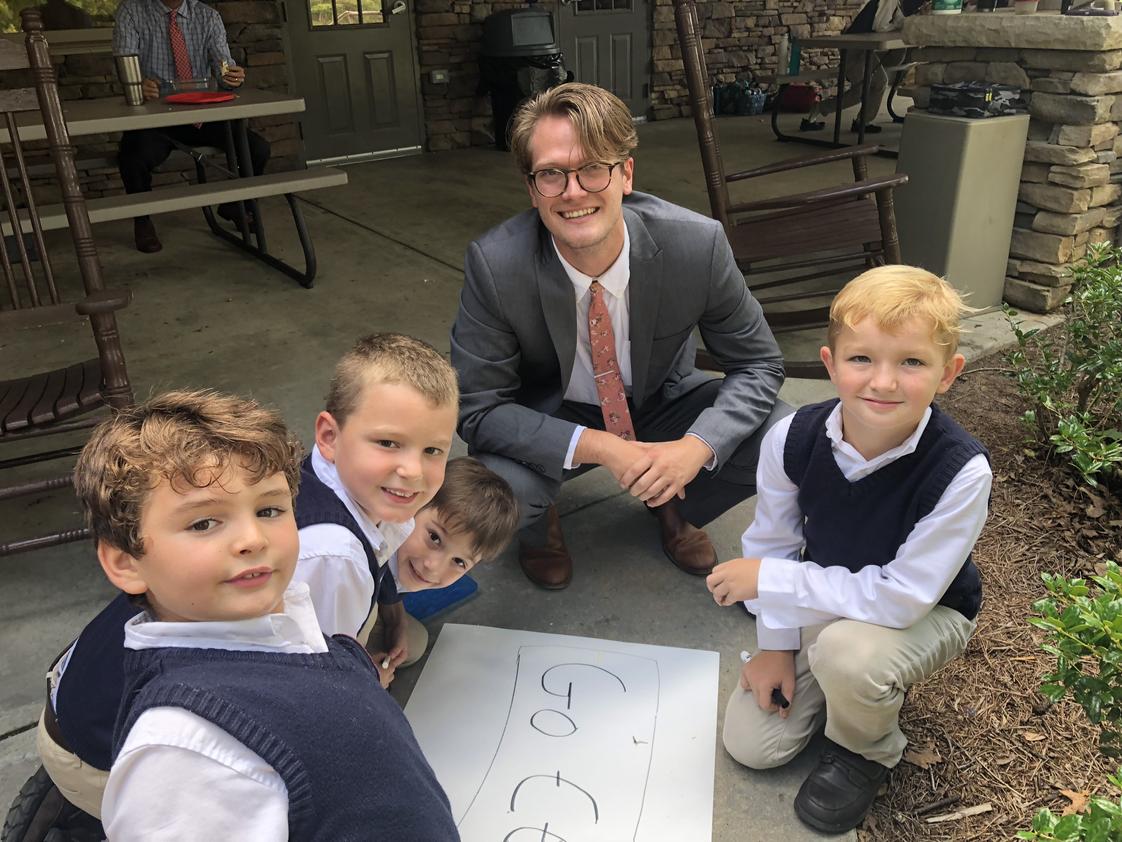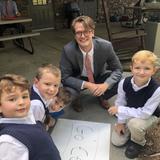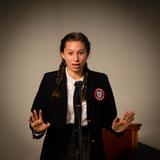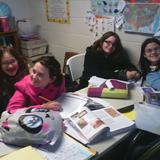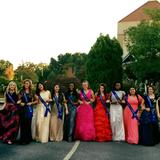Please follow this link to see a brief introduction to PCCS: https://animoto.com/play/z0Tvzu6iECb5ahTVxcJCkQ.
Quick Facts (2025-26)
- Grades: Prekindergarten-12
- Enrollment: 107 students
- Yearly Tuition: $8,318
- Average class size: 10 students
- Application Deadline: None / Rolling
- Source: Verified school update
School Overview
School Membership(s)School Assoc.
Religious Affiliation
Grades Offered
Grades Prekindergarten-12
Year Founded
2005
School Calendar
Student Body
Total Students
107 students
Student Body Type
Co-ed
% Students of Color
3%
State avg.: 28%
Students by Grade
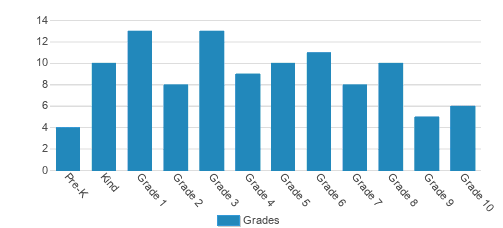
Academics and Faculty
Total Classroom Teachers
21 teachers
Student-Teacher Ratio
5:1
National avg.: 13:1
% Faculty w/Advanced Degree
25%
Average Class Size
10 students
List of Courses Offered
Average SAT score
1223
(Out of 1600)
Average ACT score
24
(Out of 36)
Matriculation DataMatric. Data
Classroom Dress Code
Formal
Uniforms
Tuition and Acceptance Rate
Admission Deadline
None / Rolling
Yearly Tuition Cost
Tuition Notes
Tuition for Grades 7 - 12 is $8318 (annually)
Tuition for Grades K - 6 is $7999 (annually)
A discount is applied if the entire annual fee is paid in one payment.
2nd child receives a 10% discount
3rd child receives a 15% discount
4th child receives a 40% discount
5th child receives a 70% discount
Admissions Director
David Bryant
Admissions Associate
Main Office
Application URL
Sports
Total Sports Offered
4 sports
Extracurriculars
Total ExtracurricularsTotal Extra-curric.
2 extracurriculars
ExtracurricularsExtra-curric.
Club or Organization:
Arts and Music Programs:
Speech and Academics
Arts and Music Programs:
Orchestra Program
School Notes
Disciples, Scholars, and Citizens
By God`s Grace we endeavor to assist Christian families in the education of their children, by providing an academic environment that is distinctly Christ-centered and classical, which is designed to equip students as disciples, scholars, and citizens who seek a life of moral and spiritual integrity, personal and social responsibility, and to know and serve the Lord Jesus Christ.
CHRIST-CENTERED
We believe a Christ-centered educationincludes not only a Christian environment where students are to be instructed withacademic excellence, but an education that places Christ at the "center of all learning."We cannot accomplish this by just adding a Bible curriculum or providing a religionclass, but rather integrating the Word of God, and placing it at the center of allcurriculum. Therefore, in all its levels, programs, and teaching, we boldly acknowledgethat all things come from our Creator and that every area of life must be subject toglorifying Him. (II Timothy 3:16-17) We commit to providing a clear model of thebiblical Christian life through our staff and board (Matthew 22:37-40) whileencouraging every student to begin and develop his relationship with God the Fatherthrough Jesus Christ (Matthew 28:18-20, Matthew 19:13-15).
CLASSICAL
In the 1940s the British author, Dorothy Sayers, wrote an essay entitled "The Lost Toolsof Learning." In it she calls for a return to the application of the seven liberal arts ofancient education, the first three being the "Trivium" grammar, logic, rhetoric. MissSayers also compares the three stages of children`s development to the Trivium. Specifically, she matches what she calls the "Poll-parrot" stage with grammar, "Pert"with logic, and "Poetic" with rhetoric (see chart below). Especially in the Rhetoricschool, classical education includes reading and discussing works which have hadsignificant influence in our culture; this is sometimes referred to as the study of "GreatBooks".
At Providence, the founding board members were intrigued with this idea ofapplying a classical education in a Christian context. Doug Wilson, a founding boardmember of Logos School, explained the classical method further in his book, Recoveringthe Lost Tools of Learning. Providence Classical Christian School is committed toimplementing this form of education.An excerpt from Doug Wilson`s book,Recovering the Lost Tools of Learning:The structure of our curriculum is traditional with a strong emphasis on "the basics."
We understand the basics to be subjects such as mathematics, history, and language studies. Not only are these subjects covered, they are covered in a particular way. For example, in history class the students will not only read their text, they will also read from primary sources. Grammar, logic, and rhetoric will be emphasized in all subjects. By grammar, we mean the fundamental rules of each subject (again, we do not limit grammar to language studies), as well as the basic data that exhibit those rules. In English, a singular noun does not take a plural verb. In logic, A does not equal not A. In history, time is linear, not cyclic. Each subject has its own grammar, which we require the students to learn. This enables the student to learn the subject from the inside out.The logic of each subject refers to the ordered relationship of that subject`s particulars (grammar). What is the relationship between the Reformation and the colonization of America? What is the relationship between the subject and the object of a sentence? As the students learn the underlying rules or principles of a subject (grammar) along with how the particulars of that subject relate to one another (logic), they are learning to think. They are not simply memorizing fragmented pieces of knowledge.The last emphasis is rhetoric. We want our students to be able to express clearly everything they learn. An essay in history must be written as clearly as if it were an English paper. An oral presentation in science should be as coherent as possible. It is not enough that the history or science be correct. It must also be expressed well.
Providence Classical Christian School seeks to accomplish the following in all its levels, programs, and teaching:
By God`s Grace we endeavor to assist Christian families in the education of their children, by providing an academic environment that is distinctly Christ-centered and classical, which is designed to equip students as disciples, scholars, and citizens who seek a life of moral and spiritual integrity, personal and social responsibility, and to know and serve the Lord Jesus Christ.
CHRIST-CENTERED
We believe a Christ-centered educationincludes not only a Christian environment where students are to be instructed withacademic excellence, but an education that places Christ at the "center of all learning."We cannot accomplish this by just adding a Bible curriculum or providing a religionclass, but rather integrating the Word of God, and placing it at the center of allcurriculum. Therefore, in all its levels, programs, and teaching, we boldly acknowledgethat all things come from our Creator and that every area of life must be subject toglorifying Him. (II Timothy 3:16-17) We commit to providing a clear model of thebiblical Christian life through our staff and board (Matthew 22:37-40) whileencouraging every student to begin and develop his relationship with God the Fatherthrough Jesus Christ (Matthew 28:18-20, Matthew 19:13-15).
CLASSICAL
In the 1940s the British author, Dorothy Sayers, wrote an essay entitled "The Lost Toolsof Learning." In it she calls for a return to the application of the seven liberal arts ofancient education, the first three being the "Trivium" grammar, logic, rhetoric. MissSayers also compares the three stages of children`s development to the Trivium. Specifically, she matches what she calls the "Poll-parrot" stage with grammar, "Pert"with logic, and "Poetic" with rhetoric (see chart below). Especially in the Rhetoricschool, classical education includes reading and discussing works which have hadsignificant influence in our culture; this is sometimes referred to as the study of "GreatBooks".
At Providence, the founding board members were intrigued with this idea ofapplying a classical education in a Christian context. Doug Wilson, a founding boardmember of Logos School, explained the classical method further in his book, Recoveringthe Lost Tools of Learning. Providence Classical Christian School is committed toimplementing this form of education.An excerpt from Doug Wilson`s book,Recovering the Lost Tools of Learning:The structure of our curriculum is traditional with a strong emphasis on "the basics."
We understand the basics to be subjects such as mathematics, history, and language studies. Not only are these subjects covered, they are covered in a particular way. For example, in history class the students will not only read their text, they will also read from primary sources. Grammar, logic, and rhetoric will be emphasized in all subjects. By grammar, we mean the fundamental rules of each subject (again, we do not limit grammar to language studies), as well as the basic data that exhibit those rules. In English, a singular noun does not take a plural verb. In logic, A does not equal not A. In history, time is linear, not cyclic. Each subject has its own grammar, which we require the students to learn. This enables the student to learn the subject from the inside out.The logic of each subject refers to the ordered relationship of that subject`s particulars (grammar). What is the relationship between the Reformation and the colonization of America? What is the relationship between the subject and the object of a sentence? As the students learn the underlying rules or principles of a subject (grammar) along with how the particulars of that subject relate to one another (logic), they are learning to think. They are not simply memorizing fragmented pieces of knowledge.The last emphasis is rhetoric. We want our students to be able to express clearly everything they learn. An essay in history must be written as clearly as if it were an English paper. An oral presentation in science should be as coherent as possible. It is not enough that the history or science be correct. It must also be expressed well.
Providence Classical Christian School seeks to accomplish the following in all its levels, programs, and teaching:
- Emphasize grammar, logic, and rhetoric in all subjects (see definitions below).Encourage every student to develop a love for learning and live up to his academic potential;
- Provide an orderly atmosphere conducive to the attainment of the above goals. Definitions -
- Grammar: The fundamental rules of each subject.
- Logic:The ordered relationship of particulars in each subject.
- Rheotoric: How the grammar and logic of each subject may be clearly expressed in a manner which is eloquent and persausive.
- We teachall subjects as part of an integrated whole with the Scriptures at the center (II Timothy 3:16-17);
- Provide a clear model of the Biblical Christian life through our Board, Administration, Faculty, and Staff. (Matthew 22:37-40);
- Encourage every student to begin and develop his relationship with God the Father through Jesus Christ (Matthew 28:18-20, Matthew 19:13-15).
Source: Verified school update
Frequently Asked Questions
How much does Providence Classical Christian School cost?
Providence Classical Christian School's tuition is approximately $8,318 for private students.
What schools are Providence Classical Christian School often compared to?
Providence Classical Christian School is often viewed alongside schools like Grace Christian Academy by visitors of our site.
What sports does Providence Classical Christian School offer?
Providence Classical Christian School offers 4 interscholastic sports: Basketball, Cross Country, Track and Field and Volleyball.
When is the application deadline for Providence Classical Christian School?
The application deadline for Providence Classical Christian School is rolling (applications are reviewed as they are received year-round).
School Reviews
Endorse Providence Classical Christian School. Endorsements should be a few sentences in length. Please include any comments on:
- Quality of academic programs, teachers, and facilities
- Availability of music, art, sports and other extracurricular activities
- Academic or athletic awards
Recent Articles

When to Apply to Private School, Admissions Deadlines for January and Fall
Learn when to apply to private school with clear guidance on admissions timelines, deadlines, and January and fall intake options.

Sliding-Scale & Income-Based Tuition Models for Private Schools
Learn how sliding-scale and income-based tuition models work and whether they are right for your family. Compare costs, eligibility, and school options.

2025 Private School Costs in the U.S.: What Families Should Expect
Updated 2025 U.S. private school tuition averages, cost breakdowns, and expert insights to help parents and students budget wisely.



